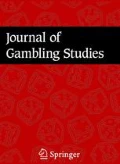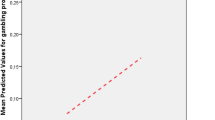Abstract
Prevalence studies have found that problem gamblers tend to be non-Caucasians. Nevertheless, information on non-Caucasian gambling patterns and problems is virtually non-existent. Data collected during years 1992–1998 on Hispanic (N = 209) and Anglo (N = 5311) problem gamblers calling the Florida Council on Compulsive Gambling Hotline for help is examined to provide information on one such non-Caucasian group: Hispanics. A sharp difference in the number of Hispanic and Anglo callers was found during this six year period (3.8% Hispanic and 96.2% Anglo). Differences were also found in the likelihood of Hispanics calling about their own problems, having gone for previous help, and types of gambling activities. Similarities were found between the two groups regarding age, marital status, and the three most cited problems caused by gambling: problems with family, inability to pay bills and going into debt. Anglos were significantly more likely to “engage in illegal activities for gambling money” and “problems with job.” Group differences caution against using Anglo based prevention and treatment programs with Hispanics populations.
Similar content being viewed by others
REFERENCES
Arredondo, R., Weddige, R. L., Justice, C. L., and Fitz, J. (1987). Alcoholism in Mexican-Americans: Intervention and treatment. Hospital and Community Psychiatry, Vol. 38(2), pp. 180–183.
Campbell, P. R. (1996, October). Population projections for states by age, sex, race, and Hispanic origin: 1995–2025. Washington, DC: U.S. Census Bureau, Population Projections Branch.
Canino, G., Anthony, J.C., Freeman, D. H., Shrout, P, and Rubio-Stipec, M. (1993). Drug abuse and illicit drug use in Puerto Rico. American Journal of Public Health, Vol. 83(2), pp. 194–200.
Gloria, A. M., and Peregoy, J. J. (1996). Counseling Latin Alcohol and other substance user/abusers: Cultural considerations of counselors. Journal of Substance Abuse Treatment, Vol. 13(2), pp. 119–126.
Murray, J.B. (1993, June). Review of research on pathological gambling. Psychological Reports, Vol. 72, pp. 791–810.
Panitz, D. R., McConchie, R. D., Sauber, S. R., and Fonseca, J. A. (1983). The role of machismo and the Hispanic family in the etiology and treatment of alcoholism in Hispanic American males. American Journal of Family Therapy, Vol. 11(1), pp. 31–44.
Volberg, R. A., and Steadman, H. J. (1989, December). Prevalence estimates of pathological gambling in New Jersey and Maryland. The American Journal of Psychiatry, Vol. 146, pp. 1618–1619.
Volberg, R. A. (1996, Summer). Prevalence studies of problem gambling in the United States. Journal of Gambling Studies, Vol. 12(2), pp. 111–128.
Volberg, R. A. (1994, February). The prevalence and demographics of pathological gamblers: Implications for public health. American Journal of Public Health, Vol. 84, pp. 237–241.
U.S. Census. (1990). Database:C90STF3A. (Online). http://venus.cenus.gov.
Author information
Authors and Affiliations
Rights and permissions
About this article
Cite this article
Cuadrado, M. A Comparison of Hispanic and Anglo Calls to a Gambling Help Hotline. J Gambl Stud 15, 71–81 (1999). https://doi.org/10.1023/A:1023019129809
Issue Date:
DOI: https://doi.org/10.1023/A:1023019129809




